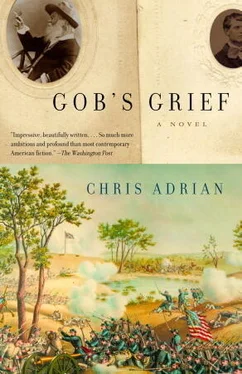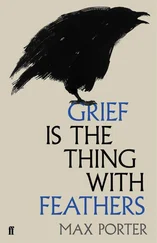Not fifteen minutes from the church, they passed the battlefield of South Mountain. Dead Rebels were stacked shoulder high along the road. Will wondered if this construction was the work of the round Frenchman. He looked down at the ground as he passed the corpses, afraid to meet their staring eyes. He thought of Sam’s body again. There would have been a funeral, back in Onondaga County, which Will had missed. Later, Will would have a dream in which he climbed a wall of bodies as high as the moon. Every body was Sam’s, and every mouth as he passed it whispered, “Aim low, Brother!”
Jolly dropped back in line to walk with him again. He held up his canteen to the orderly dead before he took a drink of water. “To your health, boys,” Jolly said.
They are swollen in this picture, too. It almost makes them look healthy, such big barrel chests, such thick legs — their clothes can barely contain them. They lie along a fence in various positions. This one has got his hands thrown over his shoulders. That one has got his hand on his belly. Where are their shoes?
The Third Onondaga was ordered away from Harpers Ferry just as they reached it, drawn down off the mountain by General McClellan’s sucking, gluttonous need for reinforcements. But they arrived too late to participate at Antietam. Will spent the night of September 17 helping carry in wounded. If they were not too fragile, he could carry them one under each arm. The darkness was a mercy — it was easier to venture among the dead when you could not see them. At dawn, he was squatting by a small fire, drinking coffee with Jolly. The sun came up and seemed to shine specifically on a house near a line of battered woods. The walls were laced with cannonball holes, but a merry white column of smoke was still rising from the broken chimney.
“Sometimes,” said Jolly, rolling his tin cup between his hands, “I worry that there is no purpose to anything. It would be the very worst news, I think.”
“God has abandoned that field, at least,” Will said, hooking his thumb over his shoulder to point at the heaped dead of the Irish Brigade. It was his shame that he lacked faith. But it made a sort of wicked sense to him that the universe should be an orphan, its own only parent, raised on a diet of self-taught, ignorant cruelty. He worried that there was nothing beyond the tangible world, that there was nothing beyond death but oblivion. On the way to Harpers Ferry, he had imagined his own death, trying to decide if he wanted to linger or go in a flash. These thoughts were his dispiriting occupation since he had become a soldier. He feared God, even though he was secretly certain there was no such fellow, and worried that some punishment greater than a joyless life might be in store for him.
“I think I shall be melancholy for a while,” said Jolly, putting his elbow on his knee, and his chin in his hand. He looked very much like Will’s brooding mother, in that posture. Will was just about to leave when a spindly corporal came to fetch him and bring him to Captain Brower’s tent. Will found the little French photographer there with the Captain. They had filled up the tent with cigar smoke.
“Here’s the boy I had in mind for you!” said Captain Brower. He introduced Will to the photographer, who was called Carnot, but Will privately dubbed him Frenchy.
“I know him,” said M. Carnot. “I know his goggling eyes.” He barked a few questions at Will in French. The Captain said Will knew French — was this true? Could he read? Was he a disciplined worker? Were his hands steady? Was he a Catholic boy?
Will answered slowly, once in French, and then again in English. He knew his French from a distant neighbor lady back in Onondaga County, to whom his mother had sent him for lessons because she was sure it would civilize him, though his father said it would sissify him. Of course he could read; he liked to think he was as disciplined as anybody; his hands were steady and he was not clumsy. “I am not a Catholic,” he added belatedly.
“Excellent,” said M. Carnot. “I am through with superstitious idolaters. You’ll do.”
Captain Brower clapped Will on the back.
“Pardon me, sir,” said Will. “Has some business been transacted?”
Some had. Will had just changed hands. M. Frenchy needed a new assistant, his last one having been bayoneted on the previous day by a wounded Reb when he approached, hesitantly, to rearrange the seemingly dead boy’s limbs into a more dramatic pose. Will would make an ideal assistant, the Captain was sure, because of his French, and because he was industrious and smart. Will had the same feeling as when he’d been kicked out of the Tiger Mess. He got no certificate this time, but he had the distinct impression he was being thrown out of Company D.
This wasn’t precisely the case. Will would still eat and sleep and fight with his company, but he was also to serve as assistant and bodyguard to the extremely well-connected M. Frenchy, who had letters from on high, through Sedgwick and McClellan all the way up to Stanton, giving him permission to put himself in the way, taking pictures of the field. Frenchy called himself an artist and a scientist; his aim, he said, was to quantify and qualify the brutality of war.
Packed bodies in a sunken road. Try as he might, Will could not resolve them into separate boys. They lay in a dead tangle, arms and legs thrown over each other. It struck him that they would embrace each other forever. Will put this picture high on the north wall of the house.
Will carried photographic equipment and helped arrange the dead, always looking away from their faces as he moved them. Some were stiff. Frenchy had screamed at him when he balked at forcing a fallen cavalryman’s arm into a more pleasing position. Will broke the poor man’s shoulder, crossing his arm over his chest, and he wondered that the whole Rebel army did not come pouring down on him, for so abusing their dead. When he was not posing the bodies, he was helping to bury them. Will put the cavalryman by himself in a deep grave lined with hay. Frenchy cursed the burying, because his precious dead were vanishing into the ground.
The Third joined the lazy pursuit that toddled after the fleeing Rebels. As they traveled, Frenchy taught Will the photographic process, screeching at him when he wasted a plate. He spent hours in Frenchy’s cramped wagon mixing collodion from guncotton and sulfuric ether and alcohol, then coating the mixture onto glass plates. Frenchy scolded like a harpy, and whenever Will did something that displeased him especially, he would emit a furious, resonant honk, like the noise of a calliope. But he also spoke generous praise — his assistant was learning quickly. Pressed for time, he brought a plate back to Will in the wagon, and let him develop it while he took another wet plate and went to make another picture. Will removed the plate from its holder. He held it over a pan and poured developer over the glass. The developer reeked like a cocktail of vinegar and blood, and he almost dropped the negative when a violent sneeze shook him. Leaning down, and squinting in the dim yellow light of the lantern, he could see the image, rising out of the glass as if up through water.
A boy with his legs all twisted up impossibly: someone has stolen his hips and replaced them with a little stretch of earth. His hand is cupped behind his ear, as if he is straining to hear some news. Will put this one on the east wall, where it would catch the light of the rising sun.
At Fredericksburg, Frenchy was made busy by the carnage below Marye’s Heights. It was December, and bitter cold. Frenchy was lost in a wilderness of borrowed coat — his own was still wet from a fall off a pontoon bridge into the Rappahannock. He swam like an otter, and had looked like one, with his wet brown hair and shiny black eyes.
Читать дальше












